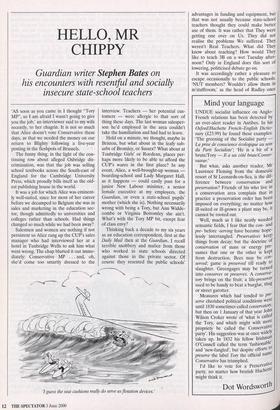Mind your language
UNDUE socialist influence on Anglo- French relations has been detected by an ever-alert reader in Antibes. In his Oxford/Hachette French–English Dictio- nary (£23.99) he found these examples: `The greening of the Socialist party — La prise de conscience ecologique au sein du Parti Socialiste'; 'He is a bit of a brute/Tory — 11 a un cote brutelConser- vateur.'
But what, asks another reader, Mr Laurence Fleming from the domestic resort of St Leonards-on-Sea, is the dif- ference between conservation and preservation? Friends of his who live in a conservation area complain that in practice a preservation order has been imposed on everything; no matter how ill-suited or ill-grown a plant may be, it cannot be rooted out.
Well, much as I like neatly weeded semantic fields, I fear that the con- and pre- before -serving have become hope- lessly intertangled. Preservatives keep things from decay; but the doctrine of conservation of mass or energy pre- sumes that one or the other is kept from destruction. Bees may be con- served; game is preserved till ready to slaughter. Greengages may be turned into conserves or preserves. A conserva- tory brings on the fruit; a life preserver used to be handy to beat a burglar, thug or street garotter. Measures which had tended to pre- serve cherished political conditions were until 1830 sometimes called conservatoiY, but then on 1 January of that year John Wilson Croker wrote of 'what is called the Tory, and which might with more propriety be called the Conservative party'. His suggestion was at once widely taken up. In 1832 his fellow Irishman O'Connell called the term 'fashionable and 'new-fangled', but despite efforts to preserve the label Tory the official name Conservative has triumphed. I'd like to vote for a Preservative party, no matter how brutish Hachette might think it.
Dot Wordsworth





































































 Previous page
Previous page